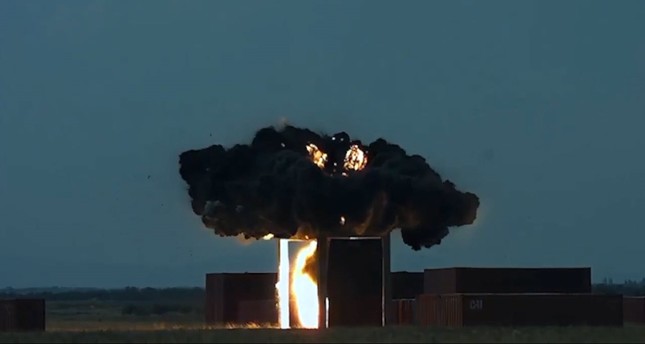Regime advance cuts off Turkish convoy in northwest Syria
19 Aug 2019
AFP / Omar HAJ KADOUR
A convoy of Turkish military vehicles passes through the town of Saraqeb in Idlib province on August 19, 2019
A Turkish military convoy crossed into jihadist-run northwest Syria on Monday, its path blocked by advancing regime troops as tensions soared between Damascus and Ankara.
Rebel-backer Turkey said its forces were targeted by an air strike, while the Syrian regime accused Turkish forces of backing "terrorists".
The convoy had entered Idlib province before heading towards a key town where Russian-backed regime forces are waging a fierce battle to retake the area from jihadists and rebels.
Turkey claimed an air strike hit its convoy, killing three civilians, though a war monitor said a Russian air raid took the lives of three rebels in the surrounding area.
Russian President Vladimir Putin told French President Emmanuel Macron Monday that Moscow supports the Syrian army's offensive against "terrorists" in the northern province of Idlib.
"We support the efforts of the Syrian army... to end these terrorist threats" in Idlib, Putin said after Macron urged respect for a ceasefire in Idlib.
After eight years of civil war, the jihadist-run region on the border with Turkey is the last major stronghold of opposition to President Bashar al-Assad's regime.
AFP / Sophie RAMIS
Syria
The region of some three million people was supposed to be protected by a Turkish-Russian buffer zone deal signed last year, but regime and Russian forces have upped their deadly bombardment there since late April.
After days of inching forward, Russian-backed regime ground forces on Sunday entered the key town of Khan Sheikhun in the south of the stronghold.
On Monday afternoon, a new loyalist advance saw pro-Damascus fighters take control part of the highway north of Khan Sheikhun, effectively blocking the Turkish military convoy from continuing south.
The Syrian Observatory for Human Rights, a Britain-based monitor with a network of contacts in Syria, said this would stop the convoy ever reaching a Turkish monitoring post south of Khan Sheikhun.
Earlier in the afternoon, an AFP correspondent saw the convoy stop on the Aleppo-Damascus highway in the village of Maar Hattat, just north of Khan Sheikhun.
- Deadly air strike -
AFP / Omar HAJ KADOUR
Around 50 armoured vehicles including personnel carriers and tanks were seen travelling southwards through Syria's Idlib province
Analysts say regime forces want to retake the key road that connects Damascus with the northern city of Aleppo, both of which they control.
Earlier, an AFP correspondent saw a military convoy of around 50 armoured vehicles including personnel carriers and at least five tanks travelling southwards along the highway.
The Observatory reported Syrian and Russian air strikes aimed at hindering the convoy's advance.
Turkey's defence ministry "strongly" condemned the attack, saying regime operations were "in violation of the existing memorandums and agreements with the Russian Federation".
The Damascus regime meanwhile denounced the convoy's crossing from Turkey.
AFP / Abdulaziz KETAZ
Damascus accused Ankara of sending the military convoy to help "terrorist groups"
"Turkish vehicles loaded with munitions... are heading towards Khan Sheikhun to help the terrorists," a foreign ministry source said, using the regime's blanket term for rebels and jihadists.
This confirmed "the support provided by the Turkish regime to terrorist groups," state news agency SANA reported the source as saying.
On Monday morning, a Russian air strike hit the rebel vehicle leading the convoy just outside Maaret al-Noman, 15 kilometres (nine miles) north of Khan Sheikhun, killing a Turkish-backed fighter from the Faylaq al-Sham group, the Observatory said.
It also killed two other opposition fighters, it added.
After the convoy entered the town, Russian and Syrian warplanes targeted the area in an apparent "attempt to prevent the convoy from advancing", Observatory chief Rami Abdel Rahman said.
- 'Protect Khan Sheikhun'? -
AFP / Omar HAJ KADOUR
Smoke billows during a reported air strike by Syrian pro-regime forces near the town of Hish in Idlib province on August 19, 2019
On Sunday, pro-regime forces backed by Russian air strikes took control of Khan Sheikhun's northwestern outskirts.
Fighting continues to the east and west of the town, the Observatory says.
The seizure of Khan Sheikhun and territory further east would encircle a patch of countryside to its south, including the town of Morek where the Turkish observation post is situated.
The Turkish army earlier said the convoy was heading towards Morek.
Analyst Nawar Oliver said the latest developments in Khan Sheikhun were likely linked to a "disagreement" between both signatories.
He said Turkey had likely sent the convoy to avoid its troops being "threatened" or placed "at the mercy of the regime and Russia".
It may have also taken a "decision to protect Khan Sheikhun", he said.
Since late April, the regime and Russia have upped their bombardment of the Idlib region, killing more than 860 civilians.
More than 400,000 people have fled their homes, the United Nations says.
Jihadist group Hayat Tahrir al-Sham, led by Syria's former Al-Qaeda affiliate, controls most of Idlib province as well as parts of the neighbouring provinces of Hama, Aleppo and Latakia.
Syria's war has killed more than 370,000 people and displaced millions since it started in 2011.
https://t.co/yGdoPWQZDl?amp=1


